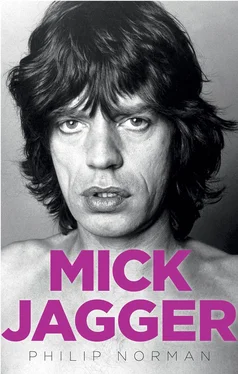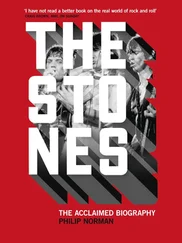1 ...8 9 10 12 13 14 ...42 Finding the blues on record was almost as difficult. It was not available on six-shilling and fourpenny singles, like rock and pop, but only on what were still known as ‘LPs’ (long-players) rather than albums, priced at a daunting thirty shillings (£1.50) and up. To add to the expense, these were usually not released on British record labels but imported from America in their original packaging with the price in dollars and cents crossed out and a new one in pounds, shillings and pence substituted. Such exotica was, of course, not stocked by record shops in Dartford or even in large neighbouring towns such as Chatham or Rochester. To find it, Mike and Dick had to go to up to London and trawl through the racks at specialist dealers like Dobell’s on Charing Cross Road.
Their circle at Dartford Grammar School included two other boys with the same recondite passion. One was a rather quiet, bookish type from the arts stream named Bob Beckwith; the other was Mike’s Wilmington neighbour, the science student Alan Etherington. In late 1959, during Mike’s first term in the sixth form, the four decided to form a blues band. Bob and Dick played guitar, Alan (a drummer and bugler in the school cadet force) played percussion on a drum kit donated by Dick’s grandfather, and Mike was the vocalist.
Their aim was not to earn money or win local fame, like Danny Rogers and the Realms, nor even to pull girls. Mike in particular – as Alan Etherington recalls – already had all the ardent female followers he could wish for. The idea was simply to celebrate the blues and keep it alive amid the suffocating tides of commercial rock and pop. From first to last, they never had a single paid gig or performed to any audience larger than about half a dozen. Dartford Grammar gave them no opportunities to play or encouragement of any kind, even though they were effectively studying a byway of modern American history; Alan Etherington recalls ‘a stand-up row’ with the school librarian after requesting a book by blues chronicler Paul Oliver as background reading for the quartet. They existed in a self-created vacuum, making no effort to contact kindred spirits in Kent or the wider world – hardly even aware that there were any. In Dick Taylor’s words, ‘We thought we were the only people in Britain who’d ever heard of the blues.’
CHAPTER TWO TWO The Kid in the Cardigan THREE ‘Very Bright, Highly Motivated Layabouts’ FOUR ‘Self-Esteem? He Didn’t Have Any’ FIVE ‘“What a Cheeky Little Yob,” I Thought to Myself’ SIX ‘We Spent a Lot of Time Sitting in Bed, Doing Crosswords’ SEVEN ‘We Piss Anywhere, Man’ EIGHT Secrets of the Pop Stars’ Hideaway NINE Elusive Butterfly TEN ‘Mick Jagger and Fred Engels on Street Fighting’ PART II: THE TYRANNY OF COOL ELEVEN ‘The Baby’s Dead, My Lady Said’ TWELVE Some Day My Prince Will Come THIRTEEN The Balls of a Lion FOURTEEN ‘As Lethal as Last Week’s Lettuce’ FIFTEEN Friendship with Benefits SIXTEEN The Glamour Twins SEVENTEEN ‘Old Wild Men, Waiting for Miracles’ EIGHTEEN Sweet Smell of Success NINETEEN The Diary of a Nobody TWENTY Wandering Spirit TWENTY-ONE God Gave Me Everything Postscript Picture Section List of Searchable Terms Acknowledgements Also by Philip Norman Copyright About the Publisher
The Kid in the Cardigan TWO The Kid in the Cardigan THREE ‘Very Bright, Highly Motivated Layabouts’ FOUR ‘Self-Esteem? He Didn’t Have Any’ FIVE ‘“What a Cheeky Little Yob,” I Thought to Myself’ SIX ‘We Spent a Lot of Time Sitting in Bed, Doing Crosswords’ SEVEN ‘We Piss Anywhere, Man’ EIGHT Secrets of the Pop Stars’ Hideaway NINE Elusive Butterfly TEN ‘Mick Jagger and Fred Engels on Street Fighting’ PART II: THE TYRANNY OF COOL ELEVEN ‘The Baby’s Dead, My Lady Said’ TWELVE Some Day My Prince Will Come THIRTEEN The Balls of a Lion FOURTEEN ‘As Lethal as Last Week’s Lettuce’ FIFTEEN Friendship with Benefits SIXTEEN The Glamour Twins SEVENTEEN ‘Old Wild Men, Waiting for Miracles’ EIGHTEEN Sweet Smell of Success NINETEEN The Diary of a Nobody TWENTY Wandering Spirit TWENTY-ONE God Gave Me Everything Postscript Picture Section List of Searchable Terms Acknowledgements Also by Philip Norman Copyright About the Publisher
Mike Jagger seemed living proof of the unnamed band’s determination to go nowhere. He remained firm in his refusal to play a guitar, instead just standing there in front of the other three, as incomplete and exposed without that instantly glamorising, dignifying prop as if he’d forgotten to put on his trousers. The singing voice unveiled by his prodigious lips and flicking tongue was likewise an almost perverse departure from the norm. White British vocalists usually sang jazz or blues in a gravelly, cigarette-smoky style modelled – vainly – on Louis ‘Satchmo’ Armstrong. Mike’s voice, higher and lighter in tone, borrowed from a larger, more eclectic cast; it was a distillation of every Deep Southern accent he’d ever heard, white as much as black, feminine as much as masculine; Scarlett O’Hara, plus a touch of Mammy from Gone with the Wind and Blanche DuBois from A Streetcar Named Desire as much as Blind Lemon Jefferson or Sonny Boy Williamson.
Unencumbered by a guitar – mostly even by a microphone – he had to do something while he sang. But the three friends, accustomed to his cool, non-committal school persona, were amazed by what he did do. Blues vocalists traditionally stood or, more often, sat in an anguished trance, cupping one ear with a hand to amplify the sonic self-flagellation. When Mike sang the blues, however, his loose-limbed, athletic body rebutted the music’s melancholic inertia word by word: he shuffled to and fro on his moccasins, ground his hips, rippled his arms and euphorically shook his shaggy head. Like his singing, it had an element of parody and self-parody, but an underlying total conviction. A song from his early repertoire, John Lee Hooker’s ‘Boogie Chillen’, summed up this metamorphosis: ‘The blues is in him . . . and it’s got to come out . . .’
Practice sessions for the non-existent gigs were mostly held at Dick Taylor’s house in Bexleyheath or at Alan Etherington’s, a few doors along from the Jaggers. Alan owned a reel-to-reel tape recorder, a Philips ‘Joystick’ (so named for its aeronautical-looking volume control) on which the four could preserve and review their first efforts together. The Etherington home boasted the further luxury of a Grundig ‘radiogram’, a cabinet radio-cum-record-player with surround sound, an early form of stereo. Dick and Bob Beckwith did not have custom-built electric guitars, only acoustic ones with metal pickups screwed to the bodies. Beckwith, the more accomplished player of the two, would plug his guitar into the radiogram, increasing its volume about thirtyfold.
At Dick’s, if the weather was fine, they would rehearse in the back garden – the future lord of giant alfresco spaces and horizonless crowds surveying a narrow vista of creosoted wood fences, washing lines and potting sheds. Dick’s mum, who sometimes interrupted her housework to watch, told Mike from the start that he had ‘something special’. However small or accidental the audience, he gave them his all. ‘If I could get a show, I would do it,’ he would remember. ‘I used to do mad things . . . Get on my knees and roll on the floor . . . I didn’t have inhibitions. It’s a real buzz, even in front of twenty people, to make a complete fool of yourself.’
Though Joe and Eva Jagger had no comprehension of the blues or its transfiguring effect on their elder son, they were quite happy for his group to practise at ‘Newlands’, in either his bedroom or the garden. Eva found his singing hilarious and would later describe ‘creasing up’ with laughter at the sound of his voice through the wall. His father’s only concern was that it shouldn’t interfere with his physical training programme. Once, when he and Dick Taylor were leaving for a practise session elsewhere, Joe called out, ‘Michael . . . don’t forget your weight training.’ Mike dutifully turned back and spent half an hour in the garden with his weights and barbells. Another time, he arrived for band practice distraught because he’d fallen from one of the tree ropes at home and bitten his tongue. What if it had permanently damaged his singing voice? ‘We all told him it made no difference,’ Dick Taylor remembers. ‘But he did seem to lisp a bit and sound a bit more bluesy after that.’
Читать дальше












